Violence against women and girls affects us all. Let us commit to the eradication of these harmful practices which concern us all.
A heavy toll
Violence against women and girls is one of the most widespread scourges affecting more than one in three women worldwide. In Haiti, the statistics are also worrying, 29% of women of childbearing age have suffered physical violence and in 45% of cases from their intimate partner. 34% of women in relationships are survivors of domestic violence, and in 37% of cases, this violence causes serious injuries. 12% of Haitian women have already suffered sexual violence, around a quarter of whom are girls aged 15-17. 31% of women also suffer or are exposed to several types of violence and psychological pressure such as excessive jealousy, limitation of contact with the outside world or family or strict control of movements, with the ultimate objective of exercising control on them.
Violence against women also affects men
The various forms of violence against women and girls in Haiti and elsewhere affect society in general, including men. Humanity is deprived of the full potential of some of its members, just because of this appalling marginalization based on gender and sex. The social and economic costs of domestic and sexual violence are enormous. These have repercussions on society as a whole. Women may suffer from isolation, inability to work, loss of wages, lack of participation in regular activities, limited ability to care for themselves, increased dependency and poverty. Children who grow up in abusive families can suffer from a range of behavioral and emotional problems. These may also be associated with later perpetrating or experiencing violence against others. In the worst cases, when a mother dies due to domestic violence, the children she leaves behind lose opportunities for a better future regardless of their gender.
Consequently, violence against women and girls, beyond the physical and psychological consequences on victims, slows down important economic and social progress. Everyone must work to put an end to it.
Toxic masculinity, a hindrance
Violence against women and girls does not only concern individuals. They are deeply linked to institutional structures and cultural barriers. Examples of this include discriminatory rules, traditions, and customs, as well as misogynistic language. People socialized within these structures, through their speeches and actions, lead to a cycle that guarantees the perpetuation of sexism.
Toxic masculinity is one of the expressions of these structural causes of violence against women and girls. It reinforces gender roles socialized by clichés and the power relations that result. While for some dominance, power and strength are considered masculine, qualities such as submission, passivity or indulgence are attributed to women. Boys and men are expected to be strong, active, emotionally inexpressive and rejecting any so-called feminine attributes. This toxic masculinity therefore continues to further exclude women from important decision-making processes and contributes to the neglect of women's needs and the establishment of violence.
These harmful norms of toxic masculinity are not only internalized by men, but also by women. According to the EMMUS VI report, 17% of women and 11% of men think it is justified for a husband to beat his wife for at least one of the following reasons: If she burns the food, if she argues with him, if she goes out without telling him, if she neglects the children and/or if she refuses to have sex with him.
Positive masculinity, an answer
Given that violence against girls and women affects the entire society and toxic masculinity reinforces them, men must take part in the fight against this scourge. During these 16 days of activism, UNFPA invites men and boys to get involved in this fight to eliminate the social and cultural obstacles that hinder gender equality.
Positive masculinity is one of the approaches which poses a perspective of breaking false beliefs and which places men as actors in the fight for a world without sexist discrimination.
Positive masculinity asserts itself as an inclusive approach that recognizes the crucial role of men and boys as partners for women's rights and who also have their own needs in establishing this balance.
This participation of men means that the fight for the emancipation of women is not a revenge of the latter on the former, but a fight of all together against violence against women and girls.


